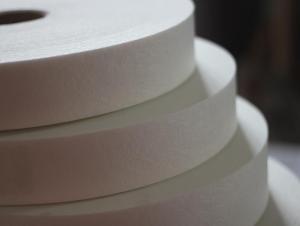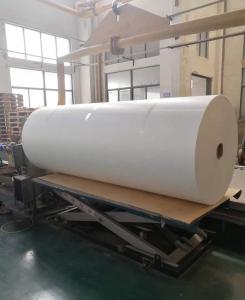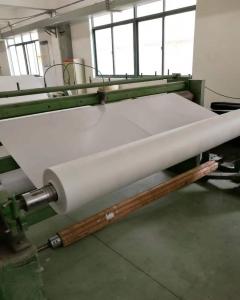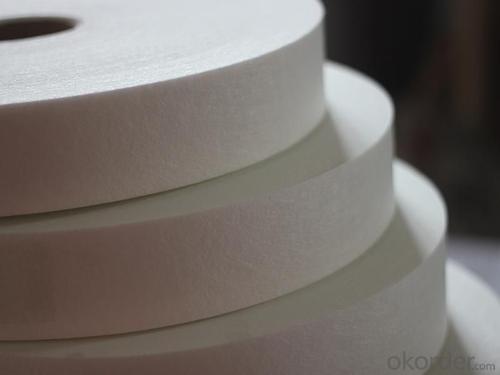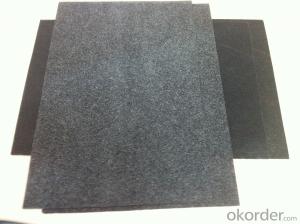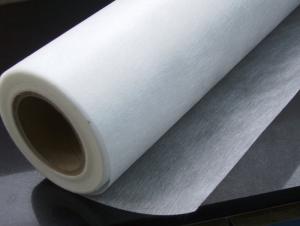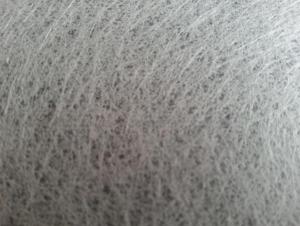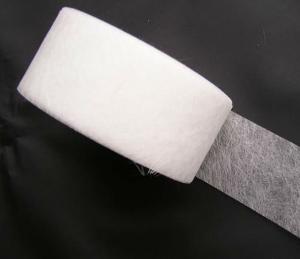C GLASS SURFACING VEIL 30GSM FIBERGLASS TISSUE
- Loading Port:
- Shanghai
- Payment Terms:
- TT or LC
- Min Order Qty:
- 7200 m²
- Supply Capability:
- 10000000 m²/month
OKorder Service Pledge
OKorder Financial Service
You Might Also Like
Material Description: C-Glass Surfacing Veil
It is mainly suitable for winding FRP pipes and tank products,which significantly improves the corrosion resistance, leakage resistance, compressive strength and appearance quality of the surface layer of the product. , prolong its service life.
Application: Used as surfacing veil for Pipes, Liners, Tank shells & Lamination
Table 1: Specification | |||
Property | Test Method | Unit | Specification |
Area Density | ISO 3374 | g/m2 | 30±3 |
Loss on Ignition | ISO 1887 | % | 6±2 |
Moisture Content | ISO 3344 | % | <=0.5 |
Tensile Strength MD | ISO 9073-3 | N/50mm | >=40 |
Wetting Speed | - | S | <=10 |
Width | - | MM | Min : 45, Max: 3100 |
Visual Appearance | - | - | White Surfacing Veil |
Compatibility | - | - | Unsaturated Polyester, Vinylester & Epoxy resins |
Package:
Each roll will be in the carton box then packed on the pallet,each pallet wrapped in PVC/PE film.
E. g. 30GSM-1000MM:20 Pallets/20GP
9 Rolls/Pallet,Pallet size will be:L1.12M*W1.12M*H1.15M
Storage:
It should be stored in a ventilated, dry and clean warehouse, stacked neatly, and it should not be squeezed, deformed or damaged, and the distance from the heat source should not be less than 2 meters.
- Q: Can fiberglass mat tissue be used for insulation in oil refineries?
- Yes, fiberglass mat tissue can be used for insulation in oil refineries. It is commonly used due to its excellent thermal insulation properties, resistance to high temperatures, and resistance to chemical corrosion.
- Q: How is fiberglass mat tissue used in the production of pipes and tanks?
- Due to its unique properties, fiberglass mat tissue is widely used in the manufacturing of pipes and tanks. This material is ideal for reinforcement and insulation purposes. By combining fine glass fibers with a binder, a thin, flexible, and porous material is created. In the production of pipes, fiberglass mat tissue serves as a reinforcement layer. It enhances the structural integrity and strength of the pipe. Typically, it is placed between multiple layers of resin, such as polyester or epoxy, during the manufacturing process. This reinforcement provides added strength and rigidity to the pipe, making it more resistant to external pressures, impact, and corrosion. Furthermore, fiberglass mat tissue improves the insulation properties of pipes. Its porous nature allows it to trap air within its structure, creating a layer of thermal insulation. This insulation helps maintain the temperature of the fluid or gas within the pipe. As a result, it reduces heat loss and energy consumption. Similarly, in the production of tanks, fiberglass mat tissue plays a crucial role in reinforcing and insulating the tank structure. It is used as a layer between the tank walls and the resin matrix, providing reinforcement and reducing the risk of structural failure. The tissue also acts as a thermal insulator, helping to maintain the desired temperature inside the tank. Overall, fiberglass mat tissue is an essential component in the manufacturing of pipes and tanks. Its reinforcement properties enhance structural integrity, while its insulation properties improve energy efficiency and temperature control. This makes fiberglass mat tissue a versatile and reliable material for various industries, including oil and gas, chemical processing, water treatment, and many others.
- Q: Can fiberglass mat tissue be used for reinforcing fiberglass pools?
- Yes, fiberglass mat tissue can be used for reinforcing fiberglass pools. Fiberglass mat tissue is a thin, flexible material that is commonly used in the construction and repair of fiberglass structures, including pools. It is made up of fine glass fibers that are bonded together with a binder. When applied to the surface of a fiberglass pool, the mat tissue provides additional strength and reinforcement, helping to prevent cracks or damage. It is typically applied in conjunction with a fiberglass resin, which acts as an adhesive to bond the mat tissue to the pool surface. Using fiberglass mat tissue for reinforcing fiberglass pools is a common practice and can help to extend the lifespan and durability of the pool.
- Q: Can fiberglass mat tissue be used for making fiberglass molds?
- Yes, fiberglass mat tissue can be used for making fiberglass molds. Fiberglass mat tissue is a lightweight material made from randomly oriented fiberglass strands. It is commonly used in composite manufacturing to provide additional strength and reinforcement to fiberglass laminates. When making fiberglass molds, the mat tissue can be used as a surface layer to create a smooth and durable finish. It helps to prevent air bubbles, improve the overall strength of the mold, and provide a good surface for the application of release agents or gel coats. However, it is important to note that fiberglass mat tissue alone may not be sufficient to create a rigid and durable mold. It is often used in combination with other fiberglass materials, such as chopped strand mat or woven roving, to provide additional strength and thickness to the mold. Overall, fiberglass mat tissue can be a useful component in making fiberglass molds, but it is typically used in conjunction with other materials to achieve the desired properties.
- Q: Can fiberglass mat tissue be used for HVAC ducting?
- HVAC ducting can indeed utilize fiberglass mat tissue. This lightweight substance is formed by bonding glass fibers with resin. Its exceptional thermal insulation qualities render it suitable for HVAC systems that prioritize temperature control. Moreover, fiberglass mat tissue boasts resistance against moisture and chemicals, assuring long-lasting durability in ducting applications. Its installation is hassle-free, and it can be tailored to fit varied duct sizes and shapes. All in all, fiberglass mat tissue emerges as a dependable and effective option for HVAC ducting.
- Q: What is the maximum temperature resistance of fiberglass mat tissue?
- Depending on its intended use and the specific product, the maximum temperature resistance of fiberglass mat tissue can differ. Nevertheless, fiberglass mat tissue is widely recognized for its exceptional thermal resistance properties. Typically, it can endure temperatures ranging from 400 to 600 degrees Fahrenheit (200 to 315 degrees Celsius) without experiencing significant structural or performance deterioration. As a result, it is well-suited for a broad array of high-temperature applications in industries such as automotive, aerospace, construction, and manufacturing, including insulation, fireproofing, and thermal insulation. It's worth noting that the precise maximum temperature resistance may vary depending on factors like the thickness, composition, and specific manufacturing processes employed for the fiberglass mat tissue. Therefore, it is always advisable to refer to the manufacturer's specifications and guidelines to ensure the appropriate usage and optimal performance of the product in high-temperature environments.
- Q: Does fiberglass mat tissue provide good thermal conductivity?
- No, fiberglass mat tissue does not provide good thermal conductivity.
- Q: Can fiberglass mat tissue be used for making insulation panels?
- Yes, fiberglass mat tissue can be used for making insulation panels. Fiberglass mat tissue is a lightweight and flexible material that offers excellent thermal insulation properties. It is commonly used as a reinforcement layer in the production of insulation panels. The mat tissue helps to enhance the strength and durability of the panels while providing effective insulation against heat transfer. Additionally, fiberglass mat tissue is resistant to moisture, mold, and mildew, making it a suitable choice for insulation applications.
- Q: Is fiberglass mat tissue suitable for HVAC insulation?
- Yes, fiberglass mat tissue is suitable for HVAC insulation. Fiberglass mat tissue is a lightweight and flexible material that is commonly used in insulation applications due to its excellent thermal insulation properties. It provides effective heat insulation, helping to maintain a comfortable and energy-efficient environment within HVAC systems. Additionally, fiberglass mat tissue is resistant to moisture and does not promote the growth of mold or mildew, making it a suitable choice for HVAC insulation where condensation and moisture may be present. It is also easy to install and can be cut to fit around HVAC components, ensuring a proper and tight insulation seal. Overall, fiberglass mat tissue is a reliable and durable insulation material that is widely used in HVAC systems to enhance energy efficiency and thermal performance.
- Q: What is the thermal stability of fiberglass mat tissue?
- The thermal stability of fiberglass mat tissue is quite high. It can withstand high temperatures without significant degradation or loss of its structural integrity.
Send your message to us
C GLASS SURFACING VEIL 30GSM FIBERGLASS TISSUE
- Loading Port:
- Shanghai
- Payment Terms:
- TT or LC
- Min Order Qty:
- 7200 m²
- Supply Capability:
- 10000000 m²/month
OKorder Service Pledge
OKorder Financial Service
Similar products
Hot products
Hot Searches
Related keywords
